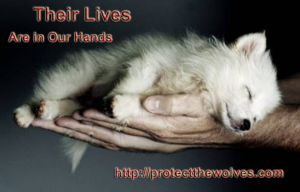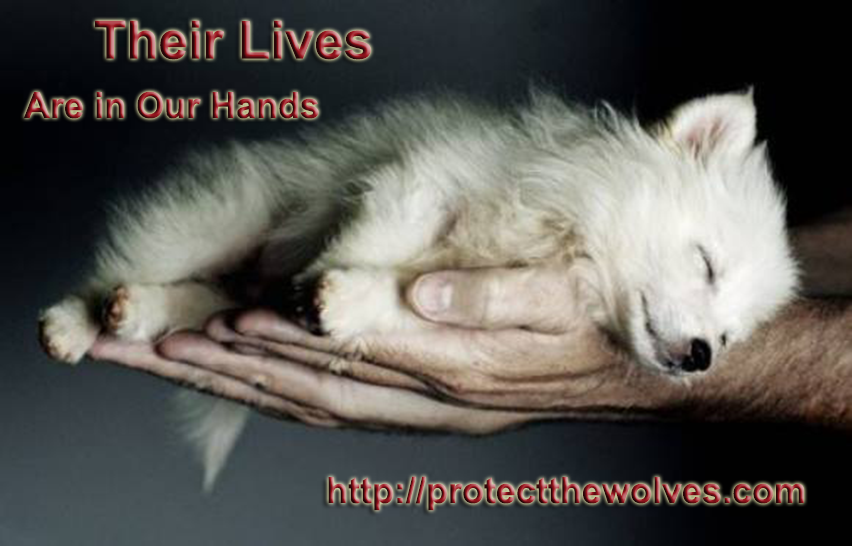
Protect The Wolves®News: More Information, that will assist us in our Quest to Speak for our Sacred Wildlife 😉
Newswise — Often touted as the greatest environmental achievement of the 20th century, the North American Model of Wildlife Conservation is anything but, say wildlife ecologists and environmental ethicists from Michigan Technological University and Michigan State University.
Writing in the Summer 2011 issue of the journal The Wildlife Professional, Michigan Tech’s John Vucetich and Joseph Bump, Michigan State’s Michael Nelson, and Canadian environmental scientist Paul Paquet call the North American Model of Wildlife Conservation seriously flawed. The commentary is the first critique that the North American model has faced.
The North American model has been around as an idea for about a decade, and in that time it has become quite popular among some wildlife professionals. The model consists of two related approaches to conservation: a historical description of past conservation efforts and an ethical prescription for the future. “One rests upon an inadequate account of history and the other on an inadequate ethic,” Vucetich and Nelson say flatly.
The model’s misconception of history gives recreational hunters the sole credit for preventing the ravages of wildlife exploitation caused by commercial hunting in the 19th century. It cites the efforts of famous hunters such as Theodore Roosevelt.
“Recreational hunting was only one of several important factors that led to improved conservation in North America,” the authors say. Since the 1960s, they point out, conservation efforts have been led by non-hunters and nature enthusiasts such as National Park visitors and bird-watchers.
The historical narrative crediting recreational hunters with spearheading the drive for wildlife conservation in turn becomes the rationale for a belief that recreational hunting is necessary for wildlife conservation. Then that becomes a prescription for future conservation efforts.
The entire construct is misguided, say Nelson and Vucetich. “The principle of past behavior is not, by itself, an appropriate justification for future behavior,” they explain. “Would you argue that society should perpetuate slave labor or gender discrimination simply because such practices are part of our history? Likewise it is wrong to conclude that hunting should play a central role in future conservation efforts simply because it has in the past.”
The scientists also express concern that the interests of recreational hunters sometimes conflict with conservation principles. For example, they say, wildlife management conducted in the interest of hunters can lead to an overabundance of animals that people like to hunt, such as deer, and the extermination of predators that also provide a vital balance to the ecosystem.
Vuetich and Nelson examine the seven tenets of the North American Model of Wildlife Conservation:
• Wildlife is held in the public trust.
• Commerce in dead animals is illegal.
• Wildlife use is allocated through law.
• Hunting is an opportunity for all.
• Wildlife may only be killed for legitimate reasons.
• Wildlife is an international resource.
• Science is the basis for wildlife protection.
“Consider the tenet that says wildlife may only be killed for legitimate reasons,” the authors observe. “This principle is as basic and appropriate as it is void of useful insight about defining a legitimate purpose.” The North American Model provides no further insight about what counts as legitimate, they note.
The scientists also raise a question about the final tenet, that science is the basis for wildlife protection. “This equates a desire for policies informed by science with science itself determining what policies ought to be adopted,” they say. “Scientific facts about nature cannot, by themselves, determine how we ought to relate to nature or which policies are most appropriate.”
The authors emphasize that they have nothing against hunting. “If the North American Model’s primary motivation was to promote hunting, and even if it did so transparently, the Model would still fall short,” they say.
The model’s greatest value, Vucetich and Nelson say, is that it calls attention to the need to confront a more basic question: What is conservation? “All of us should explore whether wildlife management and conservation are the same or whether they represent different, occasionally conflicting goals,” they suggest. “We still need answers for key questions like: What does it mean for a population or ecosystem to be healthy? How does conservation relate to or conflict with other legitimate values, such as social justice, human liberty and concern for the welfare of the individual? Resolving these and other questions could provide a truly meaningful conservation model.”

Comments
That’s putting it mildly and with too much credit to the North American Wildlife Conservation Model. I get so very angry at people who allow a dictatorship to tell them whats up or down. This entity needs to grow some balls and grab a few and pull out the short wild hairs around them, one rancher at a time, one trophy hunter at a time, one group member who dosent do his job at a time. Why exist if you are pointless or useless! There is no point to haveing an orginization that does next to nothing or nothing to defend it’s clients, in this case the wolves. When the enemy is provided amnesty from prosecution and is allowed to do as they want, while a blind eye or a turned head would catch them, then it’s time to replace the governing people. Just like our gov. at this time. Don’t lose the presious lives of the wolves because you don’t have what it takes to fight the enemy adiquitly. New people who care enough should be working there, not just for money or something to occupy their time. Get it together people!! The current laws governing the do’s and don’ts are to vague and are open to way too much interpretation by those apposing factors to saving the wolves from extinction. Or, get out and let someone who has guts and no how to get the job done, yesterday!